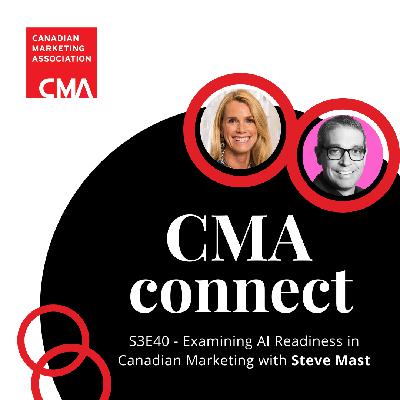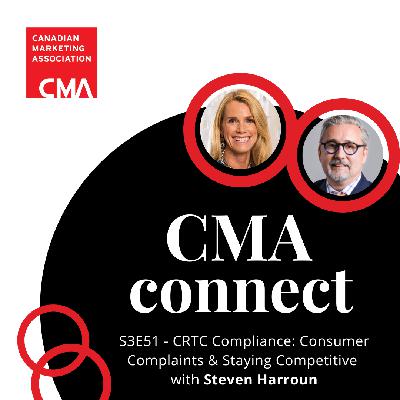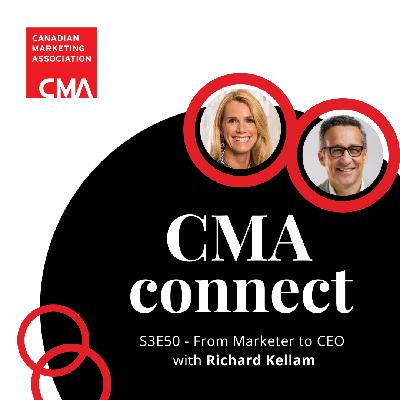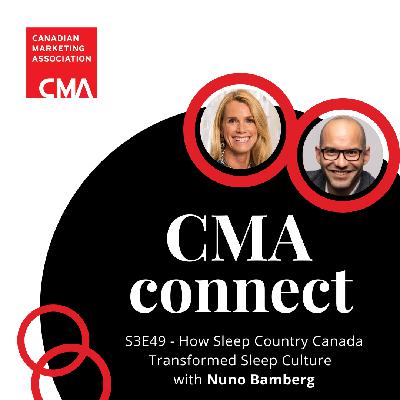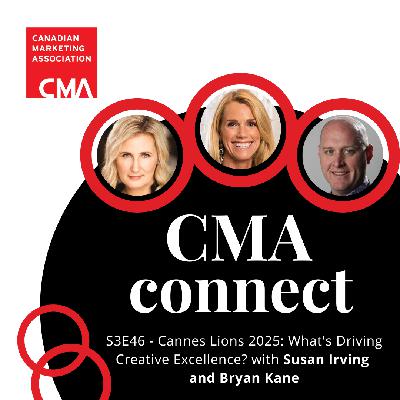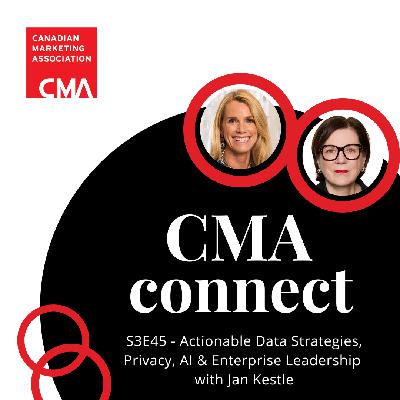EP40 - Examining AI Readiness in Canadian Marketing with Steve Mast
Description
Why should Canadian marketers care about AI today? Join CMA CEO Alison Simpson as she sits down with Steve Mast, Co-Founder and Partner at Twenty44, to uncover fresh research on how ready (or not) Canada's marketing community is for AI. Discover practical examples of AI in action, learn how to tackle governance and training gaps, and get a glimpse into the future of AI-driven marketing.
00:00:01 :18 - 00:00:22 :08
Presenter
Welcome to CMA Connect, Canada's marketing podcast, where industry experts discuss how marketers must manage the tectonic shifts that will change how brands and businesses are built for tomorrow, while also delivering on today's business needs. With your host CMA CEO, Alison Simpson.
00:00:22 :10 - 00:00:50 :02
Alison
In today's episode, we will share a new research on how the Canadian marketing community is preparing for and embracing AI. It's definitely one of the hottest topics in our profession, and we have new Canadian insights and data on how ready or not marketers are. We also have valuable learning on how they're activating the opportunities that AI represents. Joining me today is Steve Mast, the co-founder and partner of Twenty44, the company who led the research with the CMA.
00:00:50 :04 - 00:01:12 :09
Alison
Steve is a marketing leader and entrepreneur who built his career and a number of very successful businesses by focusing on innovation and helping transform organizations' business models so that they can meet the needs and demands of today's economy. Steve didn't follow a traditional path. He was educated as an architect and began his career as a video game designer before joining Delvinia,
00:01:12 :09 - 00:01:36 :14
Alison
a market research and data collection company. Over the next 20 years, Steve built their digital marketing and product teams, launching three innovative new businesses before selling the businesses in 2021. Throughout his career, Steve has consistently given back to our profession, including serving on the CMA board for eight years, two as chair. So, Steve, thank you very much for all you do to give back to our profession as well.
00:01:36 :16 - 00:01:56 :21
Alison
Today, Steve and I are digging into the research findings to discuss how ready Canadian marketers are for AI. We'll share key learning from the study and talk about the AI adoption curve. We're also going to discuss the massive opportunity that AI represents for smart marketers to leverage, to lead, and to own AI in a bigger way across organizations.
00:01:56 :23 - 00:01:58 :08
Alison
Welcome, Steve.
00:01:58 :10 - 00:02:04 :04
Steve
Thank you, Alison, and thank you for that lovely introduction as well. And it is always a pleasure to spend time with you.
00:02:04 :06 - 00:02:10 :19
Alison
The feeling is very mutual. So we're going to start by having you share who participated in the study.
00:02:10 :21 - 00:02:29 :20
Steve
I think before we get into maybe the Who, maybe start a little bit with the how we did it, just to make sure everybody's clear in terms of the approach we took. So one of the things we really wanted to do was not only collect the data and get the sort of the statistical side of things, but also get a little sense of how people were really feeling.
00:02:29 :20 - 00:02:45 :23
Steve
So we really wanted to combine a bit of a quantitative and qualitative approach to this as well. The other thing we wanted to do too, because this is a subject around AI, we were like, well, let's use some of these fantastic AI-based tools to be able to collect the information and conduct the research as well.
00:02:46 :00 - 00:03:11 :21
Steve
And I'm proud to say it's a Canadian company called Nexxt and their platform, Inca, which we ended up using to actually collect the data as well. So the CMA marketing community, as normally did not disappoint in terms of providing us with some fantastic results and ideas as well. The good thing was we really aimed to get obviously a broad cross-section of the community, and we absolutely did that.
00:03:11 :21 - 00:03:40 :09
Steve
So there was kind of like about a 50/50 split between brands and service company, agencies as well. Really good representation across sort of companies. Size almost 50% were kind of that 1 to 250 employees, but a quarter of them that participated worked at organizations that had 5000 plus employees. So really good representation. I'd also say things like age, job function, those kinds of things.
00:03:40 :09 - 00:03:50 :19
Steve
So surprisingly enough, too, we had very, very senior people, even some CMOs participated, as well as right down to kind of the manager level as well. So really good cross-section of people.
00:03:51 :00 - 00:03:59 :12
Alison
So I'd love to hear what were the top insights from the study and which ones did you expect and what were you really surprised by?
00:03:59 :13 - 00:04:22 :22
Steve
There was really kind of a couple things sort of jumped out and maybe they weren't necessarily surprises. They were probably more we kind of expected it. But there is one thing that I thought was quite interesting. And then another thing that I think is really important for us to be mindful of. So I think from an expectation perspective, marketers have always tended to be very early adopters to new technology.
00:04:22 :22 - 00:04:45 :15
Steve
I don't think that's any sort of surprise. You think of sort of the history of things like e-commerce or social media or mobile. Typically, marketers were sort of on the forefront of experimenting with those various different new technologies. In fact, about three quarters of the participants cited that they're using AI or generative AI on a weekly basis for business purposes.
00:04:45 :17 - 00:05:13 :13
Steve
But the one sort of caveat I would say about this is, of that three quarters of people, about 80% of them said they're using personal AI account, so they're not using the ones that are really provided to them by the organizations. But when we kind of dug a little bit deeper and we looked at factors like; how knowledgeable they are with generative AI, or do they understand the limitations or even how to apply it in the business, like apply it to specific areas within marketing?
00:05:13 :15 - 00:05:33 :22
Steve
Or I think even the most important thing, which I just touched on a little bit, is the ethical piece of it, the risks associated to it. I would say, surprisingly, it's a really average. The sort of, the community is, is quite sort of kind of below what I would have expected sort of knowledge workers to be. Now again, could be just we're very early days with this as well, and that could be part of it.
00:05:33 :22 - 00:05:56 :14
Steve
And there's still a steep learning curve. I'm not. Which leads me to my second point, which again, something that is not a big surprise and kind of expected. And marketers say over and over again, they are super time-strapped. They've got more channels, more different types of consumer groups to deal with, more types of technology to leverage. They're pushing out more content than ever before.
00:05:56 :16 - 00:06:19 :23
Steve
And by the way, the organization is also asking them to do more with less. So budgets are really strapped as well. So all of those things are putting pressure on them. So they're they're really looking for can AI be an unlock for them to really find those time saving opportunities? Overwhelmingly, even though they're using it a lot, they're really not seeing the benefit of this as of yet.
00:06:19 :23 - 00:06:48 :10
Steve
And and by the way, I wouldn't sort of take that, sort of paint that brush across everybody. I think it just depends on what you're doing. But I would say just as an overall, they're not really finding the benefits. And I think this really comes down to really two fundamental foundational issues that are really going on. So one - almost half, like 44% of the members, really did not know or were not clear what the organization's policy was.
00:06:48 :11 - 00:07:11 :02
Steve
So this is a governance challenge, right. And they're asking the questions around, the policy is vague and doesn't really specify on what restrictions, how do I use it. So it tends to be kind of again, sort of a sort of a one size fits all. And marketers have very unique needs. So there's a real challenge around sort of policy and governance with that as well.
00:07:11 :04 - 00:07:31 :06
Steve
The second thing, which I think is leading to this thing where they're really not seeing the benefits from it, is, again, a little more than half, about 56%, said they either not getting training or was really ineffective. And again, when they say that, it's not that they're not being maybe taught some prompt engineering or some basic elements around,
00:07:31 :06 - 00:07:55 :00
Steve
and by the way, CMA provides all kinds of great training around this, but they're not necessarily seeing the benefits of the training or they're not getting specific training around the areas that matter to them. So they're not really understanding the proficiency around how to use generative AI. They want to see results, right? They feel like this is a great mechanism or vehicle or new technology, but they're not seeing the benefits yet.
00:07:55 :02 - 00:08:16 :10
Alison
That's definitely fascinating, and I am very surprised that more of them are not seeing the benefits yet. And when you talked about the 44% that don't know what their company's guidelines a

